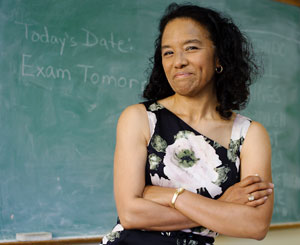Breast Cancer: Serena's Story
 Imagine having to travel to a scary place you've never been before. You don't speak the language, you fear for your life and...your tour guide is a no show.
Imagine having to travel to a scary place you've never been before. You don't speak the language, you fear for your life and...your tour guide is a no show.
That's how 52-year-old Serena Culley felt as she sat waiting for a needle biopsy that would ultimately confirm she had breast cancer. It was November 2010 and she was scared and all alone in the room.
But then, help arrived. "She introduced herself as Faith and told me she was there to hold my hand and talk to me during the biopsy," Serena says. And just like that, Faith Courville, RN, CBPN-IC, nurse navigator, Holy Cross Hospital, had become an integral figure in Serena's life.
Nurse navigators help patients understand their diagnosis and treatment options, and serve as an advocate, educator and guide throughout a patient's cancer experience.
"I do whatever I can to help women through this difficult and overwhelming journey," Faith says. "I help women like Serena understand their diagnosis and treatment options, and I answer their questions, provide advice and give support."
Nurse Navigators
Once the reality of her breast cancer diagnosis set in, Serena was depressed. She had difficulty coping with the unnerving new set of challenges occurring in her daily life. "There were days I couldn't get out of bed and times where I'd roll onto the floor, pray, and somehow make it to the shower," Serena confides.
It was during those days when Serena gained immense strength from Faith. "I could call her any time-day or night, on her cell phone-when I was feeling depressed or having a bad day," Serena explains. "She was my best friend through this journey; I don't know what I would have done without her."
Faith went with Serena to her oncology appointments to help her understand the complex language of breast cancer care. And, she was at her side before and after her two lumpectomies in February and March 2011.
The Latest Treatment Options
"Expert surgeons at Holy Cross Hospital offer several different surgical approaches for breast cancer patients," explains Eric Oristian, MD, medical director, Breast Services, Holy Cross Hospital. "Breast-sparing lumpectomies remove the cancer and some of the normal tissue surrounding it, but not the breast. A mastectomy removes the entire breast."
After her second lumpectomy, Serena underwent radiation therapy, which works by destroying or slowing down the growth of quickly growing cancer cells.
The Holy Cross Hospital Radiation Treatment Center provides women with the latest in breast cancer therapy offering both whole and partial breast radiation, including a new technique that delivers radiation treatments as close as possible to the tumor site.
In conjunction with surgery and radiation therapy, some women will have chemotherapy during their treatment for breast cancer. Chemotherapy uses drugs to kill cancer cells.
Managing Lymphedema
Serena developed lymphedema, a condition some women acquire who have had lymph nodes removed during certain breast cancer surgeries. It is caused by inadequate tissue fluid drainage.
The Lymphedema Program at Holy Cross Hospital offers a comprehensive treatment and management program that aims to reduce the swelling and pain associated with lymphedema and to educate patients to monitor, maintain, and improve their condition throughout their lifetime.
Finding Strength
Holy Cross Hospital's Survivors Offering Support (SOS) program connects breast cancer survivor mentors with newly diagnosed patients. As Serena transitioned from "breast cancer treatment" to "life after breast cancer," Faith introduced her to an extension of the SOS program called, Transition to Wellness. This workshop helps women transition back to the new "normal" after active treatment ends.
During her breast cancer journey, Serena found strength she didn't think she had. She will be on hormone therapy for five years and confidently says, "I have more courage now to do things I was afraid to do before breast cancer."
